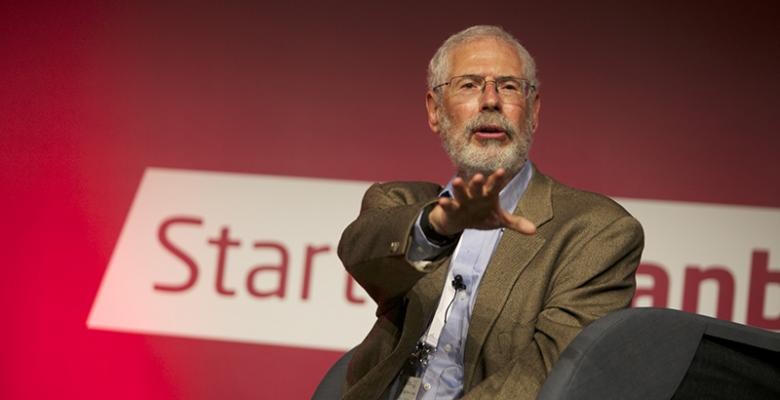5 Questions: Steve Blank on Why Founders Behave Badly – and How to Fix It

Founders of “unicorn” startups, the rare fledgling companies already valued at $1 billion or more, seem to be making news for all the wrong reasons lately. Uber, Theranos, Zenefits, and others have been in the headlines for missteps by their chief executives.
Tech entrepreneur and author Steve Blank put these “founders who go too far” into the context of the last several decades of entrepreneurship in a recent article in the Harvard Business Review. Blank, who came to Columbia in 2015, is a University senior fellow for entrepreneurship and a lecturer at Columbia Business School.
The author of four books about entrepreneurship, Blank arrived in Silicon Valley in 1978, at the very beginning of the startup boom, founded or was part of eight ventures and launched the “Lean Startup” movement, which touted the principle that startups must operate differently from big companies to be successful.
Q. What is your takeaway from what we've seen happen with founders who’ve behaved badly?
A. In essence what we’ve done is give people who have practiced on fancy flight simulators the ability to fly passenger planes without any instruction, and the results quite often have been disastrous. That has emerged from a silent evolution of the relationship between founders and their investors.
Companies facing crises like Theranos, Uber, and Zenefits are examples not just of founders acting badly, but of venture capitalists (VCs) abdicating their fiduciary responsibility in these early-phase ventures. The biggest surprise is how many startups still manage to do as well as they do.
Q. Have businesses always started in this way?
A. Change has occurred incrementally. In the mid-20th century, there was almost a master-student relationship—investors would put money into technology startups and the founders worked to find what we now call a product-market fit. The goal was to generate revenue and profit and then take the company public. Once the company was public, the investors would immediately remove the founding CEO, thinking he or she didn’t have the skill sets to build a scalable business. They would then bring in a “suit” to be chief executive, a seasoned MBA who had the necessary experience to build the company.
Another reason for bringing in a “suit” was that when you went to raise money from institutional investors for a public offering, no one wanted to see a scruffy kid in a hoodie. In the 1970s and ‘80s technology changes happened more slowly, in cycles of two-to-three years. A company didn’t have to constantly innovate, so it could build a scalable business on the technology it had.
Beginning in the 1990s and early 2000s, a couple of things changed. For the first time, a tech company went public without profits or revenue: Marc Andreessen’s Netscape in 1995. Technology cycles began to turn faster and it helped to keep the founder at the company to continue to innovate. Essentially, founders were CEOs with training wheels. However, to investors on the board of directors, founders were still employees.
Q. How does a new venture get off the ground now?
A. In 2009 Marc Andreessen co-founded a venture-capital firm—Andreessen Horowitz—that recognized that a founder in the 21st century could be trained to be a CEO, that they were smart, had access to information and were necessary assets to keep up with even more rapid tech cycles.
Soon there was a race among VCs to see who could be the friendliest to founders, which translated into a lot of power for the founders. They were given the ability to sell more stock, extra board seats, and sometimes more voting rights than their investors. There was an explosion of startups and it became a seller’s market. Instead of startups competing for money, VCs were competing to get one or two “unicorns” in their portfolio.
Q. Should today's founders partner with seasoned experts?
A. I’ve had the pleasure of teaching entrepreneurs at Stanford, UC Berkeley, and now Columbia. My students know more in an hour than I knew in 20 years. They have more information available to them with books, classes, and the internet. Even living next to Sand Hill Road [home to many venture-capital companies], what I could learn about how to be a successful CEO was limited by my number of trips to get coffee.
What you can’t substitute is experience and the internalization of that experience over time, which is sometimes called wisdom. The smartest CEOs surround themselves with experienced advisors.
Q. You work with Columbia startups. What advice do you give founders?
A. Just because you read about it, don’t believe you understand it. Just because you have some great insights about your business, doesn’t mean you know how to run it. Having an advisory board is critical. I’m not talking about the advisory board you have for branding purposes, to show investors that you have credibility, I’m talking about people you can talk to and not worry about saying, “I’m stuck” or “I think I screwed this up.” It’s more like having a shrink. Entrepreneurs should always be looking at peers, guest speakers, teachers to see if there is some wisdom there.
When you know a lot and you’re disrupting markets and everyone has told you your initial idea was stupid, but then it took off anyway—at that point, you are primed to think all advice is stupid. However, hubris is death for a startup.